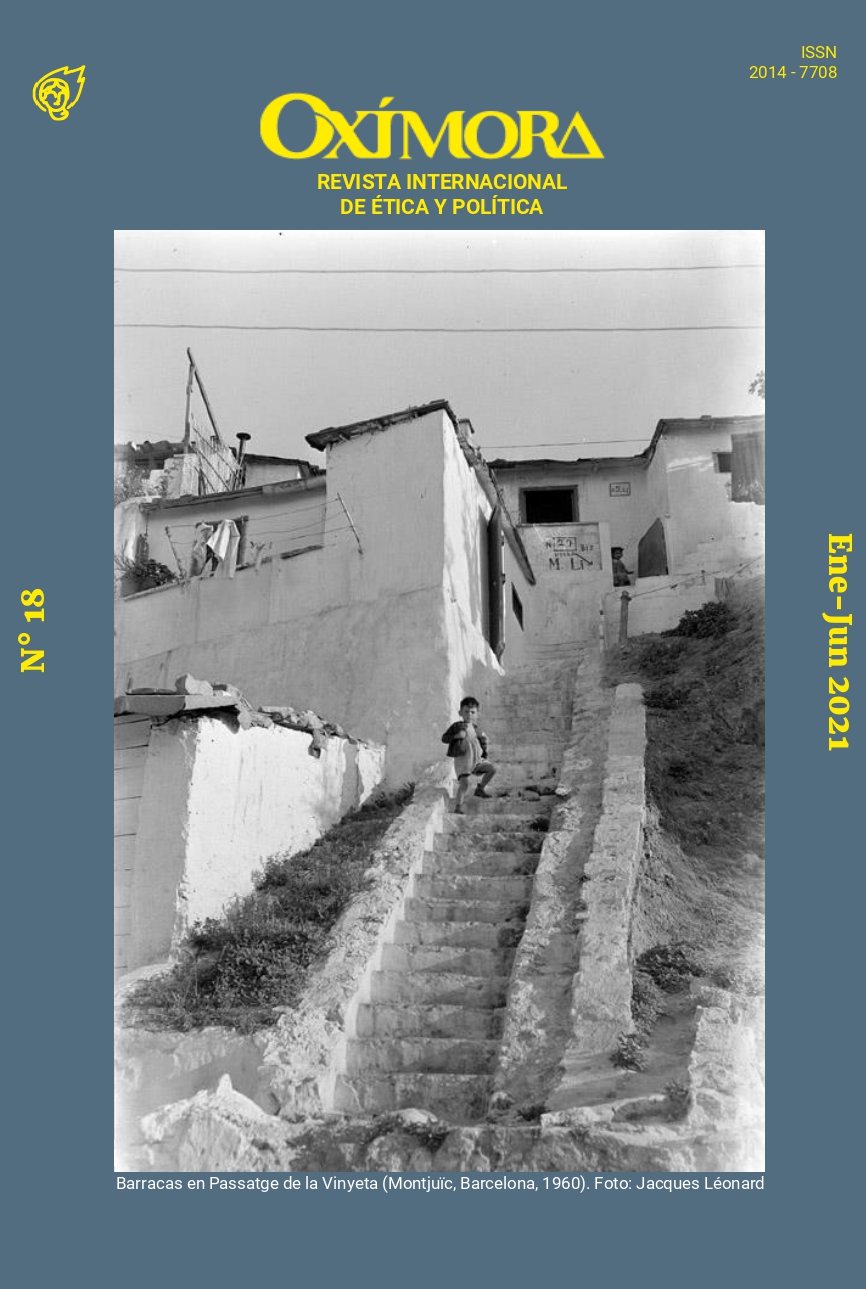Managing Modern Social Conflict through Mixed Ethical Foundations: Deontology, Consequentialism, and Virtue Ethics as Pillars of Salvador Giner’s Republicanism
DOI:
https://doi.org/10.1344/oxi.2021.i18.31511Palabras clave:
Salvador Giner, republicanism, deontology, consequentialism, virtue ethicsResumen
Abstract: A few years before his death in 2019, Salvador Giner noted the extreme difficulty of durably realizing the “estado precario” of social concord and the relative ease with which societies experience “un estado natural” of discord. So he recalled his decades-long intellectual project of developing a republican political theory that seeks optimal social relations while pessimistically assuming the inevitability of discord. This article argues that Giner’s pessimistic, tragic outlook is evinced through the heterogeneous ethical philosophical theories—deontology, consequentialism, and virtue ethics—he proposes as guiding principles of republican democracy, theories that must necessarily coexist, though they are ultimately incompatible.
Citas
Aristotle (2001). The Basic Works of Aristotle. Ed. Richard McKeon. New York: Modern Library.
Barber, Benjamin. (1984). Strong Democracy: Participatory Politics for a New Age. Berkley: University of California Press.
Béjar, Helena. (2007). “Salvador Giner: la inteligencia sociológica.” In Escritos sociológicos en homenaje a Salvador Giner. Eds. Manuel Pérez Yruela, Teresa González de la Fe and Teresa Montagut. Madrid: Centro de Investigaciones Sociológicas. pp. 261-76.
Beltrán Villalva, Miguel. (2007). “La sociología y el progreso de la conciencia sociológica.” In Escritos sociológicos en homenaje a Salvador Giner. Eds. Manuel Pérez
Yruela, Teresa González de la Fe and Teresa Montagut. Madrid: Centro de Investigaciones Sociológicas. pp. 25-38.
Dahl, Robert. (1971). Polyarchy: Participation and Opposition. New Haven: Yale UP.
Descartes, René. (1991). The Philosophical Writings of René Descartes: The
Correspondence. Vol. 3. Trans. Cottingham, Stoothoff, Murdoch, and Kennedy. Cambridge UP.
Díaz, Elías. (2007). “Salvador Giner: un sociólogo con carisma.” In Escritos sociológicos en homenaje a Salvador Giner. Eds. Manuel Pérez Yruela, Teresa González de la Fe and Teresa Montagut. Madrid: Centro de Investigaciones Sociológicas. pp. 109-18.
Foot, Philippa. (1972). “Morality as a System of Hypothetical Imperatives.” Philosophical Review. 84, pp. 305-16.
Giner, Salvador. (1987a). El destino de la libertad. Madrid: Espasa-Calpe.
__________. (1987b). Ensayos civiles. Barcelona: Edicions 62.
__________. (1993). “La religión civil.” Reis: Revista española de investigaciones sociológicas. 61, pp. 23-56.
__________. (1995). “Lo privado público: altruismo y politeya democrática.” Revista de Estudios Políticos. 88 (Abril-Junio), pp. 9-27.
__________. (1996a). Carta sobre la democracia. Barcelona: Ariel.
__________. (1996b). “Altruismo y politeia democrática.” Contrastes 1, pp. 259-82.
__________. (1997). “Intenciones humanas, estructuras sociales: para una lógica situacional,” in Cruz, Manuel (ed.) Acción humana. Barcelona: Ariel. pp. 21-126.
__________. (1998). “Las razones del republicanismo.” Claves de Razón Práctica 81, pp. 2-13.
__________. (2002). “La urdimbre moral de la modernidad.” Anales de la Cátedra Francisco Suárez 36, pp. 63-100.
__________. (2003). Carisma y razón. Madrid: Alianza.
__________. (2007). “Dignidad cívica.” Clave de Razón Práctica. 173, pp. 4-14.
__________. (2008a). “El destino de la sociedad civil.” Revista Española del Tercer Sector. 10 (septiembre-diciembre), pp. 17-49.
__________. (2008b). “Hobbes, fundador de la concepción moderna de la ciudadanía,” in Meil Landwerlin, Gerardo, and Cristóbal Torres Albero (eds.) Sociología y realidad social: libro homenaje a Miguel Beltrán Villalva. Madrid: CIS. pp. 1287-93.
__________. (2012). El origen de la moral. Barcelona: Península.
__________. (2014). “Dónde quedó la concordia.” El Ciervo. 62 (748), pp. 8-13.
Giner, Salvador, and Victoria Camps. (1998). Manual de civismo. Barcelona: Ariel.
Hegel, G. W. F. (2008). Outlines of the Philosophy of Right. Trans. T. M. Knox. Oxford UP.
Kant, Immanuel. (1957). Perpetual Peace. New York: Liberal Arts.
__________. (1997). Critique of Practical Reason. Ed. and trans. Mary Gregor. Cambridge UP.
Kupperman, Joel. (1988). “Character and Ethical Theory.” Midwest Studies in Philosophy. 13, pp. 115-25.
MacIntyre, Alasdair. (2007). After Virtue. University of Notre Dame Press.
Michels, Robert. (1915). Political Parties: A Sociological Study of the Oligarchical Tendencies of Modern Democracy. Trans. Eden and Cedar Paul. New York: Hearst’s International Library Co.
Moncada, Alberto. (2007). “Los sociólogos mayores.” In Escritos sociológicos enhomenaje a Salvador Giner. Eds. Manuel Pérez Yruela, Teresa González de la Fe and Teresa Montagut. Madrid: Centro de Investigaciones Sociológicas. pp. 129-36.
Montesquieu. L’ésprit des lois. Paris: Gallimard, 1995.
Ovejero Lucas, Félix. (2007). “La sociología crítica.” In Escritos sociológicos en homenaje a Salvador Giner. Eds. Manuel Pérez Yruela, Teresa González de la Fe and Teresa Montagut. Madrid: Centro de Investigaciones Sociológicas. pp. 89-108.
Pérez Yruela, Manuel. (2007). “Republicanismo y corporatismo.” In Escritos sociológicos en homenaje a Salvador Giner. Eds. Manuel Pérez Yruela, Teresa González de la Fe and Teresa Montagut. Madrid: Centro de Investigaciones Sociológicas. pp. 145-57.
Robinson, William I. (1996). “Globalisation: Nine Theses on Our Epoch.” Race and Class. 38 (2), pp. 13-31.
Sandel, Michael. (1998). Debating Democracy's Discontent. New York: Oxford UP.
Tàbara, J. David. (2007). “El pensamiento ambiental de Salvador Giner.” In Escritos sociológicos en homenaje a Salvador Giner. Eds. Manuel Pérez Yruela, Teresa González de la Fe and Teresa Montagut. Madrid: Centro de Investigaciones Sociológicas. pp. 237-48.
Tönnies, Ferdinand. (2001). Community and Civil Society. Trans. Jose Harris and Margaret Hollis. Cambridge UP.
Vargas-Machuca Ortega, Ramón. (2007). “La huella de la tradición emancipatoria en Salvador Giner.” In Escritos sociológicos en homenaje a Salvador Giner. Eds. Manuel Pérez Yruela, Teresa González de la Fe and Teresa Montagut. Madrid: Centro de Investigaciones Sociológicas. pp. 39-54.
Voltaire. Œuvres Complètes. Vol. 18. Paris: Garnier, 1878.
Wolf, Susan. (1982). “Moral Saints.” Journal of Philosophy. 79 (8), pp. 419-39.
Descargas
Publicado
Cómo citar
Número
Sección
Licencia
a) El/la autor/a conserva los derechos de autoría, otorgando a la revista el derecho de primera publicación de la obra.
b) Los textos se difundirán con la licencia de reconocimiento de Creative Commons (CC BY) que permite compartir la obra con terceros, siempre que estos reconozcan su autoría, su publicación inicial en esta revista y las condiciones de la licencia.



